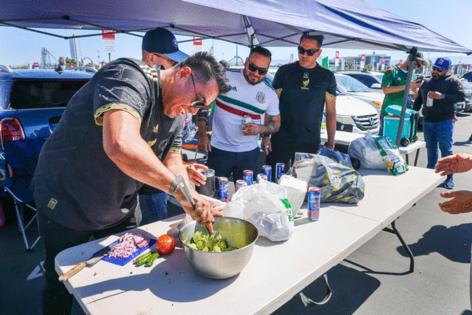Mexico, Honduras fans bring typical passion to Gold Cup semifinal at Levi's Stadium despite ICE worries
Published in Soccer
SANTA CLARA, Calif. — Sports bring fans together from all different parts of the world. But what happens when those fans fear attending matches?
That’s the reality some of the 70,975 fans attending Mexico’s 1-0 win over Honduras in the CONCACAF Gold Cup semifinal had to face on Wednesday at Levi’s Stadium. Amid a festive tailgate and stadium atmosphere was the specter of ICE raids that are being carried out across the nation.
“I know a lot of friends, that’s why they didn’t come,” said Carlos Martinez, a Honduras supporter from San Jose.
Levi’s Stadium was filled to near capacity, but there were visible patches of open seats in the upper deck. Levi’s Stadium’s capacity is 75,000 for special events like the Gold Cup.
Soccer in the U.S. has increasingly become a political battleground. With the FIFA Club World Cup and CONCACAF Gold Cup being held at American venues, the issues surrounding the immigration policies of President Donald Trump’s administration have come to the forefront.
Before a Club World Cup match in Miami, U.S. Customs and Border Protection posted on social media that it would be “suited and booted” to help provide security. Some interpreted that as a threat to screen fans attending the match and potentially detain certain attendees whose citizenship status might be in question.
There were unconfirmed reports of ICE activity, but no agents were visible. Still, the possibility wasn’t far from the minds of those attending.
“You’re talking about what’s going on right now. It’s kind of tense,” said Luis Dominguez, a chef who owns a Mexican restaurant in Ceres, a small town near Modesto. “But Mexicans, we’re always going to try to find a way to make it happen. It’s going to be having a good time, going to the game and supporting the team.”
Dominguez was mixing up fresh guacamole for a tailgate, and there was a lot more where that came from. Fans were grilling carne asada, pollo asado and al pastor, and preparing Honduran enchiladas.
The atmosphere was similar to what you’d typically see at a Mexico match in the Bay Area. Friends Luis Rangel and Pablo Ramirez of San Jose took turns kicking a soccer ball across a net, and mariachi music flooded the tailgate lots.
“Once it comes to the game, once it comes to playing the game of soccer, everyone comes together, and they come out and they just want to have a good time,” Rangel said. “We’re aware of the situation, but at the same time, we all want to come together and just have a good day, enjoy the game.”
A group of Honduran fans improvised a makeshift dance floor and stepped in time to traditional Punta music. Mexico had been to Levi’s Stadium before, but this year’s Gold Cup marked Honduras’ first appearance in the Bay Area in eight years.
“This is something that I don’t know when it’s going to happen again,” Ramirez said. “Who knows? It is a moment. You only live once.”
But the threat of deportation and the aggressiveness of the Trump administration’s immigration policy lingered in the background. Just a day earlier, a coalition of 90 civil rights groups sent a letter to FIFA, urging soccer’s international governing body to exert its influence to “guarantee the fundamental rights of the millions of football fans who will seek to attend the World Cup next summer.”
There has been concern that fans from certain countries will be unable to travel to the U.S. and watch their teams or will be detained and deported upon entry. The letter noted its worry that “the FIFA brand will be used as a public relations tool to whitewash the reputation of an increasingly authoritarian government.”
Then on Wednesday, a legal group with ties to the Trump administration filed a complaint against the Los Angeles Dodgers, accusing the team of “apparently engaging in unlawful discrimination under the guise of diversity, equity, and inclusion.”
The complaint may be in response to the Dodgers’ refusal to let ICE use its parking lots for federal immigration activities two weeks ago.
With the World Cup just around the corner in 2026 and fans from countries around the world expected to descend upon the U.S., the immigration issue isn’t going away anytime soon.
“People, I don’t want to say they’re scared, but they feel like, ‘We’ve been here a long time, and we support this country,’” said Alfonso Villafan of Castro Valley. “We love this country, and we feel like they’re not doing well. It does affect how many people come to the stadium. It’s definitely a factor.”
____
©2025 MediaNews Group, Inc. Visit at mercurynews.com. Distributed by Tribune Content Agency, LLC.







Comments